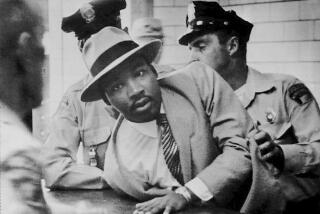Pulitzer Winner Was 94 : Dumas Malone, Noted for Jefferson Biography, Dies
CHARLOTTESVILLE, Va. — Dumas Malone, whose monumental biography of Thomas Jefferson earned him the Pulitzer Prize in 1975, died Saturday at the age of 94. Malone died at his home after a brief illness, said a spokesman at the University of Virginia, where Malone spent most of his teaching and writing career.
Malone began work on his prize-winning biography, “Jefferson and His Time,” in 1943. In 1981, almost totally blind at age 89, he completed the sixth and final volume with the aid of a researcher who tape-recorded material for him and a video screen that magnified his script 40 times.
“Well, he’s not the sort of man who gives himself away,” Malone once said of the figure he devoted much of his life to understanding. “Jefferson never kept a diary and rarely referred to personal matters in letters.
‘I Understand Him’
“But on the other hand, I have had the privilege of reading the letters, and his contemporaries did not have that. I think I know how his mind works pretty well, and, yes, I think I understand him pretty well.”
Malone, professor emeritus at the university founded by Jefferson, so thoroughly immersed himself in the life of the nation’s third President that he sometimes spoke of Jefferson in the present tense.
University President Robert M. O’Neil said it was through Malone “that most of us came to know and understand--and revere--Thomas Jefferson.”
“More than any biographer who comes to mind, Mr. Malone embodied in his own life and scholarship the very values of that eminent American about whom he wrote,” he said Saturday.
Malone was the oldest man ever awarded a Pulitzer when he won the prize in the history category at the age of 83.
‘Writes With Sympathy’
Reviewing the final volume, “The Sage of Monticello,” in The Times, Carolly Erickson wrote: “To say that ‘The Sage of Monticello’ smoothes over the rough places of Jefferson’s life would be true, yet misleading. For if the portrait of Jefferson is idealized, it is also marmoreally serene and aesthetically satisfying to an extraordinary degree. Malone writes with sympathy, comprehensive authority and enviable grace about a great man, adopting an epic pace and tone that make his work as classical as the pillars of Monticello itself.”
On the whole, Malone told an interviewer, his opinion of Jefferson had risen over the years, although he had also learned more about the man’s weaknesses. Most of all, he was in awe of Jefferson and his colleagues for a quality he said had disappeared from American politics.
“They thought more about the future,” he said, “and they knew more of the past.”
A native of Coldwater, Miss., Malone received a bachelor’s degree from Emory College, now Emory University, and earned master’s and doctorate degrees from Yale. He joined the University of Virginia faculty in 1923.
In 1929, he became editor of “The Dictionary of American Biography,” overseeing publication of 17 of the original 20 volumes of that standard reference work.
Harvard Press Editor
From 1936 to 1942, Malone was editor in chief of the Harvard University Press in Cambridge, Mass. He returned to the University of Virginia in 1943, accepted a teaching post at Columbia University in 1945, retired in 1954 and went back to Virginia as the Thomas Jefferson Foundation professor of history. He became biographer-in-residence upon his second retirement in 1962.
His other works included “Empire for Liberty,” a 1960 history of the United States, and “The Story of the Declaration of Independence,” published in 1975.
Survivors include his wife, Elisabeth, a son, a daughter and a granddaughter. The funeral service will be private. A university spokesman said plans for a memorial service are pending.
More to Read
Sign up for our Book Club newsletter
Get the latest news, events and more from the Los Angeles Times Book Club, and help us get L.A. reading and talking.
You may occasionally receive promotional content from the Los Angeles Times.







